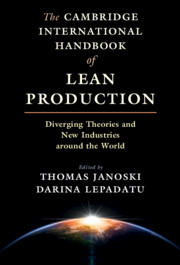 The Cambridge International Handbook of Lean Production
The Cambridge International Handbook of Lean Production Book contents
- The Cambridge International Handbook of Lean Production
- The Cambridge International Handbook of Lean Production
- Copyright page
- Dedication
- Contents
- Tables
- Figures and Sidebars
- Preface
- Acknowledgments
- Contributors
- Abbreviations
- 1 Lean Production as the Dominant Division of Labor
- Part I Theories of Lean Production
- Part II Lean Production across Industries
- Part III Lean Production Around the World
- 17 Lean in Europe and the USA – A New Dominant Division of Labour?
- 18 The Development and Diffusion of the Hyundai Production System
- 19 Transferring Lean to the United States
- 20 Disseminating Lean across the UK: A Personal Reflection
- 21 Lean Production in Germany
- 22 Tricolore
- 23 Lean Production in China: A Case Study of the Automobile Industry
- 24 Lean Production in India and Australia
- 25 The Four Stages of Lean in Mexico
- 26 Lean Production in Post-Communist Europe
- Name Index
- Subject Index
- References
18 - The Development and Diffusion of the Hyundai Production System
from Part III - Lean Production Around the World
Published online by Cambridge University Press: 11 March 2021
- The Cambridge International Handbook of Lean Production
- The Cambridge International Handbook of Lean Production
- Copyright page
- Dedication
- Contents
- Tables
- Figures and Sidebars
- Preface
- Acknowledgments
- Contributors
- Abbreviations
- 1 Lean Production as the Dominant Division of Labor
- Part I Theories of Lean Production
- Part II Lean Production across Industries
- Part III Lean Production Around the World
- 17 Lean in Europe and the USA – A New Dominant Division of Labour?
- 18 The Development and Diffusion of the Hyundai Production System
- 19 Transferring Lean to the United States
- 20 Disseminating Lean across the UK: A Personal Reflection
- 21 Lean Production in Germany
- 22 Tricolore
- 23 Lean Production in China: A Case Study of the Automobile Industry
- 24 Lean Production in India and Australia
- 25 The Four Stages of Lean in Mexico
- 26 Lean Production in Post-Communist Europe
- Name Index
- Subject Index
- References
Summary
Hyundai Motor Company (hereafter HMC) is a “Cinderella” case of the global auto industry, in that it has shown strong growth from a Korean small domestic automaker in South Korea (hereafter Korea) to one of the major contenders in the global auto markets over the past decades. The history of HMC, which started its manufacturing operation to assemble American-designed cars (i.e., the Ford Cortina CKD) for local consumption, has since exemplified a success story of transforming its fortunes “from rags to riches” (Wright et al. 2009). Since 2010, the Hyundai Motor Group, comprised of HMC and Kia Motor Company (KMC), has been ranked among the global top five automakers, both in terms of production volume and sales units worldwide (Song 2017).
- Type
- Chapter
- Information
- The Cambridge International Handbook of Lean ProductionDiverging Theories and New Industries around the World, pp. 448 - 466Publisher: Cambridge University PressPrint publication year: 2021


